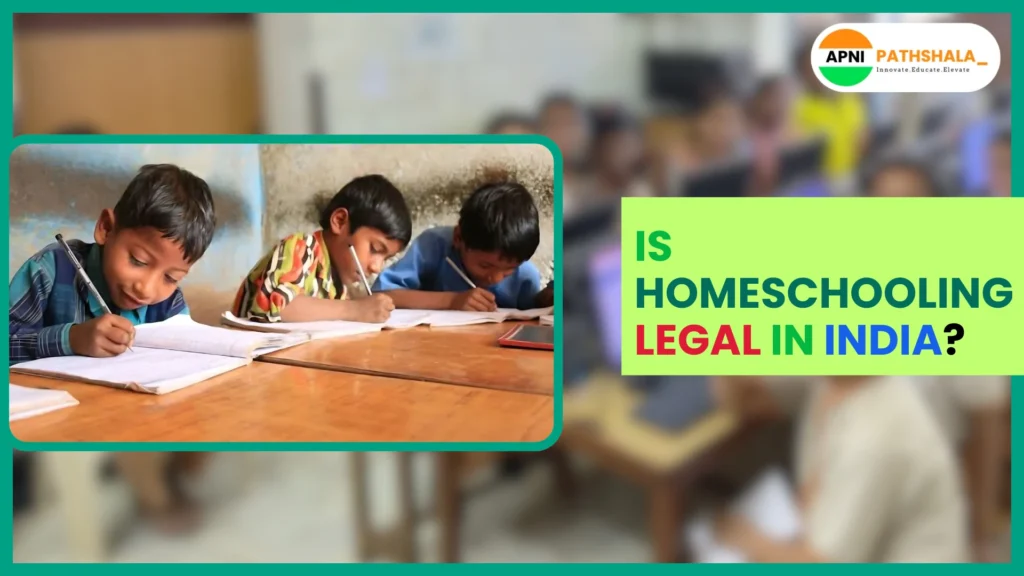Is homeschooling legal in India?

So you’ve been hearing about homeschooling lately. Maybe from a friend. Maybe from Instagram. Or maybe because your child just isn’t vibing with the traditional school setup. But here’s the BIG question popping up in your mind: “Wait, is homeschooling even allowed in India? Like legally?” You Google it. You open a few tabs. You find yourself drowning in opinions, government jargon, and confusing articles that give you everything except a clear answer. So let’s break it all down. Plain and simple. No fluff. No grey areas. Just the real deal about homeschooling in India—what’s allowed, what’s not, and how you can actually start. Let’s get into it. First Things First: What is Homeschooling? Let’s not complicate this. Homeschooling simply means educating your child at home, rather than sending them to a formal school. It doesn’t mean your child sits around watching cartoons all day. It also doesn’t mean you need to become a PhD professor to teach them. It just means YOU, the parent (or tutor), decide the: It’s flexible, personal, and very much real. Now, the big question… So, Is Homeschooling Legal in India? Let’s be blunt: Yes. Homeschooling is valid and legal in India. Here’s why: The Right to Education Act (RTE), 2009 says that every child between the ages of 6 to 14 has a right to free and compulsory education. But it doesn’t say that this education must only happen in a traditional school. The law cares about education, not necessarily the format. There is no rule in the Indian Constitution that says homeschooling is illegal. In fact, in 2011, a Public Interest Litigation (PIL) was filed in the Delhi High Court asking for clarity. The government’s reply? Parents have the liberty to educate children the way they want, as long as it doesn’t violate their right to education. So yes, homeschooling is absolutely valid under Indian law as of 2025. What Does the RTE Act Actually Say? Let’s break down the legal language into plain words: A few court judgments and policy documents have even hinted that alternative forms of education are acceptable. So while homeschooling may not be officially recognised by CBSE or ICSE, it is still legal and practised. Which Boards Support Homeschooling in India? Alright, if your child isn’t going to a regular school, what about certificates? Exams? Boards? Here are your main options: NIOS (National Institute of Open Schooling) Cambridge IGCSE (for international curriculum) CBSE/ICSE How to Start Homeschooling in India? (Step-by-Step) Ready to go the homeschooling route? Here’s how you can begin: 1. Decide Why You’re Doing It Before diving into homeschooling in India, take some time to reflect on why you want to do it. Are you looking for more flexibility in your child’s schedule, a better focus on mental health, or the ability to travel more? Or perhaps, you’re after academic freedom, where your child learns at their own pace. Knowing your motivations will help you decide how to structure your homeschooling approach and which tools or resources will best suit your needs. 2. Pick a Curriculum or Board Choosing the right curriculum for homeschooling is crucial. In India, you have several options: 3. Create a Routine (Not a Strict Timetable) Unlike traditional schooling, homeschooling allows for flexibility in scheduling. Instead of sticking to a rigid timetable, create a learning routine that works for your child. Some kids work best in the morning, others in the afternoon. Homeschooling in India gives you the freedom to tailor their day based on what suits them best. The goal isn’t to replicate a school schedule but to foster an environment where your child can thrive academically and personally. 4. Join Homeschooling Communities Being part of a homeschooling community can provide immense value. There are active homeschooling groups in India on Facebook, WhatsApp, and other forums where parents share advice, learning resources, and ideas for field trips. Joining communities like Swashikshan can offer insights into how other parents are structuring their child’s learning experience, helping you stay motivated and connected. 5. Track Progress (But Don’t Stress Over It) Tracking your child’s progress is important, but it doesn’t need to be stressful. Instead of daily exams or tests, consider using a learning log or portfolio to document milestones. This can include projects, assignments, and reflections on their growth. When it’s time to transition to board exams, having a record of their learning journey will make the process easier and less stressful. Is Homeschooling Right for Your Child? Ask yourself: If you’re nodding yes, homeschooling might be a great fit. Common Misconceptions about Homeschooling in India Myth: “Homeschooled kids don’t get into college.”Fact: Not true. NIOS is recognised by Indian universities. IGCSE is accepted internationally. Myth: “Homeschooling is only for the rich.”Fact: NIOS is budget-friendly. You don’t need fancy materials, just a plan and commitment. Myth: “My child won’t have friends.”Fact: Joining co-ops, local activity classes, online clubs, and socialising is entirely possible. Myth: “Homeschooling is too rigid, and the child will miss out on a well-rounded education.”Fact: Homeschooling is flexible, allowing a personalised, well-rounded education. Myth: “Homeschooling takes too much time and effort.”Fact: Homeschooling saves time by eliminating commute and allowing focused learning. Apni Pathshala: Your Partner in Homeschooling India Homeschooling doesn’t mean doing it alone, and ApniPathshala is here to support you every step of the way. We connect learning pods, microschools, and homeschoolers across India, building a strong community where parents can collaborate, share resources, and grow together. We also provide PCs with webcams and essential learning resources to help your child’s educational journey. Whether you’re looking for curriculum guidance, teaching tools, or simply a community to lean on, ApniPathshala is your trusted partner in homeschooling. Ready to start your homeschooling journey with us? Contact ApniPathshala and take the first step toward a brighter educational future today!
